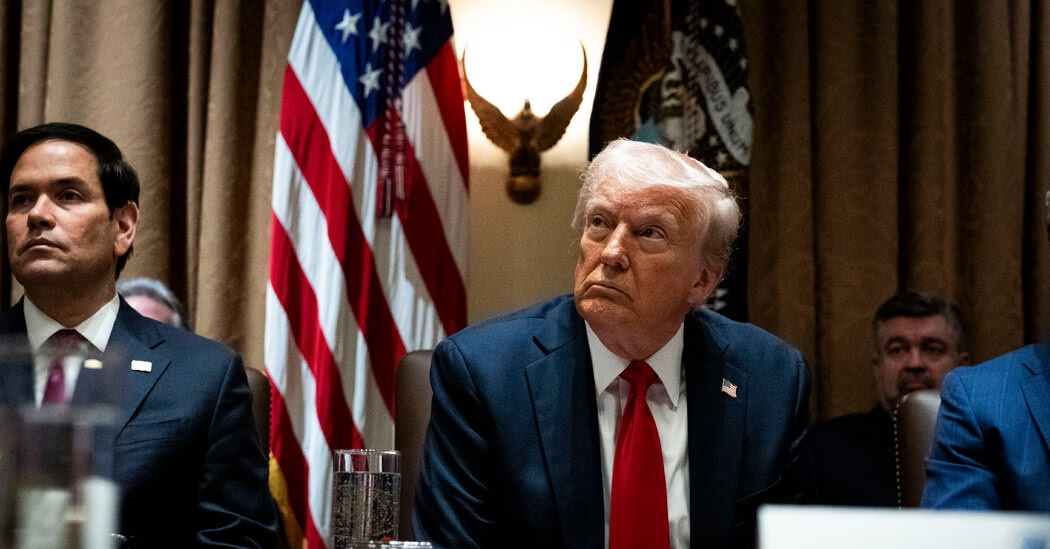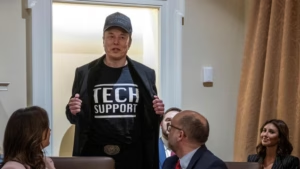During his first term, President Trump referred to the European Union as a “foe” established to harm the United States in terms of trade. At a cabinet meeting, he told a more explicit version: the EU was formed to exploit the United States and has done so effectively. Then, he signaled his intention to impose 25% tariffs on cars and other goods imported from Europe.
After Trump’s stance towards Russia and warning Europe to protect itself, the latest attack by Trump further fueled the view among European leaders and analysts that he and his loyalists perceive traditional American allies in Europe as adversaries not just in trade but on nearly all matters.
Some officials and analysts see the Trump administration as indifferent to Europe, while others view it as openly hostile. There is, however, a consensus that the fundamental relationship has shifted, and that America is no longer as reliable or predictable an ally.
Trump has maintained a confrontational approach towards NATO, aligning with Russia and criticized European democracy while supporting far-right parties. Notably, the United States abstained from condemning Russia’s invasion of Ukraine at the United Nations, aligning its vote with Russia, Belarus, and North Korea.
European leaders are actively attempting to minimize the damage. Prime Minister of Britain, Keir Starmer, visited the White House hoping to persuade Trump not to abandon Ukraine and remain engaged in Europe. But Trump describes himself as a disruptor, and his previous meeting with France’s President Emmanuel Macron yielded little progress.
Friedrich Merz, the potential next chancellor of Germany, expressed significant skepticism about the trans-Atlantic relationship his country has long maintained. He emphasized the need for Europe to quickly bolster its strength and seek independence from the USA in light of the changing American policies and support for far-right parties that despise European governments and align with Russia.
Merz’s stance echoes former German Chancellor Angela Merkel’s 2017 statement about欧洲 allele of fully trusting others, advocating for Europe to take its destiny into its own hands. While Merkel’s words were seen as a significant shift, a realignment in European security policy did not occur. Today’s circumstances are considered more drastic by Claudia Major of the German Institute for International and Security Affairs.
The Trump administration’s alignment with the far-right and condemnation of European policies indicate a shift in the relationship that goes beyond indifference and involves an intent to undermine Europe. Nathalie Tocci, director of Italy’s Institute of International Affairs, suggests that this is part of a strategy to destroy the European Union, with the support of far-right parties playing a key role.
Europe’s economic power gives it the capability to respond economically to Washington, which could be why Trump views the EU as an economic and ideological threat. This includes the “Brussels Effect,” the EU’s ability to set global rules and norms, particularly in climate change, digital competition, and artificial intelligence – areas of special interest to the American administration.
If the Trump administration’s goal is to annihilate this threat, there is little Europe can do to appease the White House, warns Tocci. Europe’s increased dependency on American LNG or weaponry would not matter in this scenario and could even be detrimental.
The current clashes between the U.S. and Europe are not only about ideology and security but also about economy, making the situation unprecedentedly complex. Whether Europe will be seen as a rival or adversary by the U.S. remains uncertain, but European countries are reevaluating their relationship with Washington.
Geopolitics and Security Studies Center Director Linas Kojala urges caution, noting that there is currently no viable alternative to the U.S. security guarantee. Despite the current tensions, Kojala advocates for Europe to maintain the relationship with the United States as best it can.
However, the relationship is likely to be permanently altered. Former MI6 chief Alex Younger points to a new era for international relations, driven not by rules and multilateral institutions but by strongmen and deals. Former defense department official Matthew Kroenig suggests that the initial Trump term’s rhetoric did not lead to a weakening of NATO and that the current concern might be overblown.
Nonetheless, Nigel Gould-Davies from the International Institute for Strategic Studies points to a policy of strategic surrender, where the U.S. is rapidly conceding established positions, undermining trust with allies, and enhancing Russia’s power and appeal to America’s adversaries around the world.
Source: https://www.nytimes.com/2025/02/27/world/europe/trump-eu-allies.html





